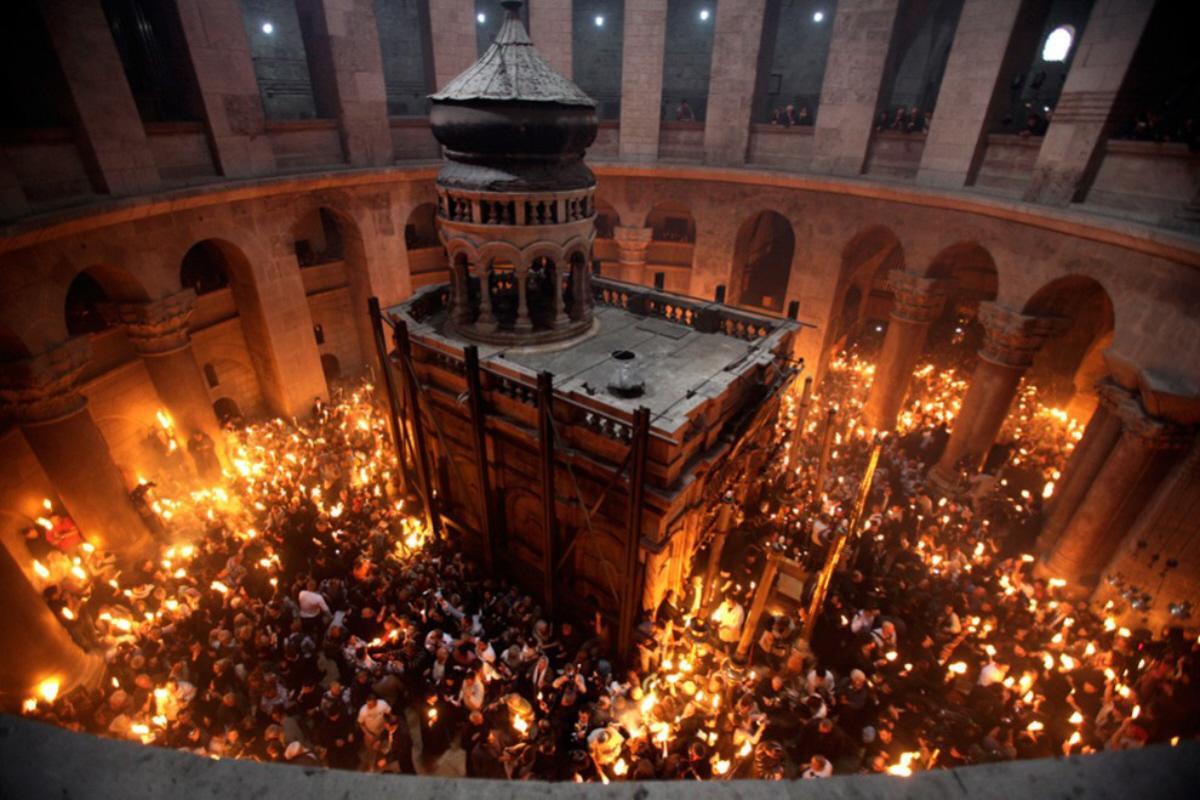
Palestinian Easter at the Church of the Holy Sepulchre

Palestinian Easter at the Church of the Holy Sepulchre
By Rev. Dr. Jack Sara, President of Bethlehem Bible College
In February of this year, the Church of the Holy Sepulchre was temporarily closed by Jerusalem’s Christian leaders in protest of a new taxation imposed upon the Christian institutions by the city of Jerusalem. This was an unexpected break in the status quo going back to the Ottoman era which had previously granted tax-free status to the city’s religious institutions. The shocking announcement included a century of back taxes, totaling almost $200 million; an expense that would have forced many ministries out of the land. Some leaders felt this imposition was a way to continue to weaken the presence of Christians in the city. In protest, the Church of the Holy Sepulchre, one of Jerusalem’s most-visited sites was closed.
Because this event took place about a month before Easter, there were worries that church would remain shut during our holiest season. Thankfully, after three days of closure the situation was at least temporarily resolved, and the doors of one of the world’s oldest churches were swung back open.
As Christian Palestinians, these issues affect us in a personal way. It reminded me of my upbringing in the Old City and caused me to reflect on the significance of these sites.
I grew up on the Via Dolorosa, quite close in proximity to the Church of the Holy Sepulchre in the Old City of Jerusalem. My parents still live at the 8th station of the Via Dolorosa, where it is traditionally believed Jesus addressed the women of Jerusalem who were mourning as he carried his cross to his death.
“But Jesus turning unto them said, Daughters of Jerusalem, weep not for me, but weep for yourselves, and for your children” (Luke 23:28).
At one time, the 8th station of the cross was set by one of the gates of Jerusalem as one departed the city towards Golgotha. The current walls now include the area where it is believed that Jesus was crucified, buried and resurrected; now marked by the ancient church.
You might say that the place of Jesus’ crucifixion is in my backyard. The Church is a dominant structure of my neighborhood, and its scent of candles and incense perfume the streets of my childhood. As one who grew up around such a place, my life is steeped in the imagery of Jesus’ last days in Jerusalem: of Good Friday and the following triumphant Sunday morning. As we approach the season this year, I cannot help but reflect once again about the importance of the cross and the hardship our Lord had to suffer— culminating in His death on the cross—in order to bring salvation to the world.
While in the West this holiday is known as Easter; here in the Holy Land we call it the Pascha feast, or the Resurrection celebration. This celebration has an affectionate nickname in Arabic called Eid Al Kabeer, which essentially means “the big holiday.” Accordingly, Christmas usually is called “the small holiday.”
Palestinians call it Eid Al Kabeer because the resurrection is the hope for all Christians. Particularly here and across the wider Middle East, where suffering and hardship has been the primary description of our lives for so long, Eid al Kabeer is what gives us strength. Through decades of war, upheaval, violence, occupation and injustice, we relate with the Apostle Paul who said,
“We are afflicted in every way, but not crushed; perplexed, but not despairing; persecuted, but not forsaken; struck down, but not destroyed; always carrying about in the body the dying of Jesus, so that the life of Jesus also may be manifested in our body. For we who live are constantly being delivered over to death for Jesus’ sake, so that the life of Jesus also may be manifested in our mortal flesh.” (2 Corinthians 4:8-11).
During Easter, Palestinian Christians remember the suffering of Jesus in different expressions and traditions. For Lent, we may fast from food or sweets. We participate in processions through the alleys of Jerusalem and Mount of Olives. But we also engage in celebrations that take place around the Holy Sepulcher in Jerusalem, joined by other worshippers from around the world. Every year, we are reminded again of the life of Christ working in and through us in behalf of all nations.
It is the hope of the resurrection that continues to give us the stamina to serve our Lord in this land. Though it has been, and continues to be, a land of suffering and bloodshed, it is still the land of good tidings where the Gospel message began. From Jerusalem, His Word has been proclaimed to the ends of the earth. While we at Bethlehem Bible College continue to suffer with our people, we also share in the joy which is found in the knowledge of God. We know that we are ultimately called to the higher purpose of expanding God’s Kingdom and making the name of Jesus famous, both locally and globally.
As we celebrate the Big Feast, we also wish that it may be “the big celebration” for our brothers and sisters around the world. We pray that together our lives will become radiant with the love of the Lord who continually calls us from death into the power of His resurrection.

